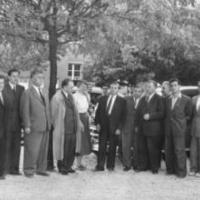
Interzonal Neuhausen-Zurich 1953
When asked which book had a profound influence on their development as players, most strong players would name manuals like Nimzowitsch’s My System or books with selections of games like Fischer’s or Kasparov’s best games. Modern players will name Rybka and Fritz as best "books" to study. But if a tournament book is discussed, it will almost inevitably be Zurich 1953. That is also one of my most favourite.
This tournament brought together the full spectrum of chess greatness at that time - the best fifteen players of the day, all except for the reigning champion Mikhail Botvinnik.
Vasily Smyslov took a slim lead at the tournament's half-way point, but at least three more players kept their chances almost till the end. Those included firstly Samuel Reshevsky, who was the only threat to the Soviet hegemony by that time:
Another powerful pursuer was Paul Keres, an eternal winner of 2nd prizes, who never got the chance to play a match for the World title. In addition to playing some excellent games, he here introduced a line that still carries his name:
The third player was David Bronstein himself, who would not have minded paying another visit to the World Champion after their equal match in 1951:
However, throughout the whole event, the harmonious style of Smyslov was most impressive. In the end he managed to win the direct encounters against his main rivals showing both excellent defense against Keres, and subtle positional understanding against Reshevsky. This was his cycle!
The event introduced the King’s Indian Defense at the highest level of play, and ever since it has been a regular feature in tournaments everywhere.
“It’s a difficult thing to maintain objectivity when commenting on one’s own games. Variations running in the commentator’s favour are always interesting, so details flow quick and plentiful from the pen; variations, which favour one’s opponent, are often as clear as can be. For one’s own mistakes one seeks (and generally finds) justification; while the opponent’s errors seem as natural as to need no explanation whatever.” This is what Bronstein writes in the forward of the fifth game in the tournament book, his first win in the event against Taimanov.
However, he is the man to keep objectivity till the very last page of this masterpiece. He is a very honest and sensitive annotator, and his comments consist of both chess truths and invaluable practical advices. Bronstein always finds warm words for his respected opponents, even when they don't demonstrate their best chess.
The tournament was rich in excellent games, and it was a great difficulty choosing the most beautiful ones. Here are two of them:






